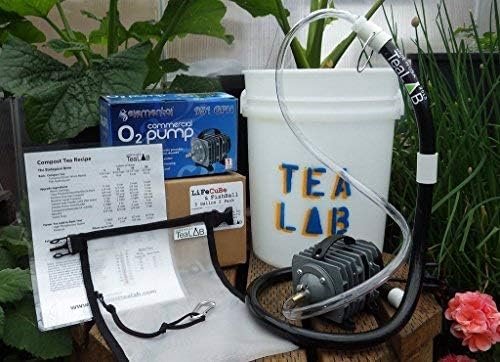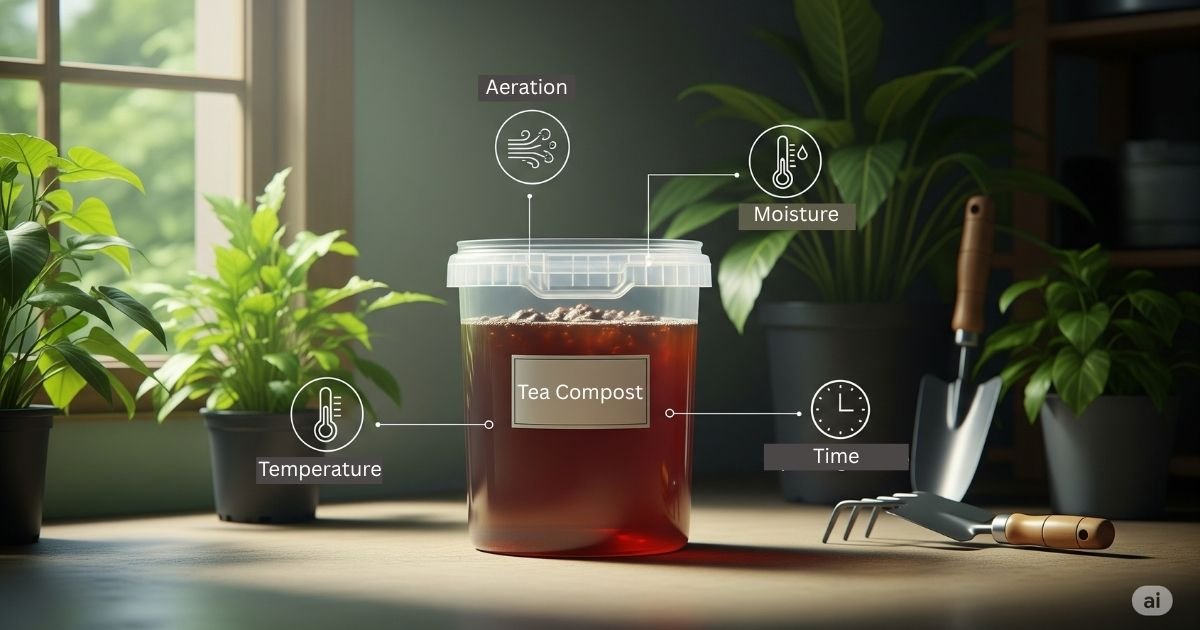Compost tea is a liquid gold for gardeners, a nutrient-packed, microbe-rich brew made by steeping compost in water. When applied properly, it boosts soil fertility, improves plant immunity, and fosters beneficial microbial life.
But here’s the catch: compost tea is a living solution. Improper storage can kill its beneficial microbes and render it ineffective—or even harmful. This article will walk you through how to store compost tea the right way, ensuring your garden receives all the benefits nature intended.
What is Compost Tea, and Why Is It So Sensitive?
Compost tea is a liquid extract of compost, often made by steeping compost in water (with or without aeration) for 12 to 48 hours. The result is a solution rich in:
- Beneficial bacteria and fungi
- Protozoa and nematodes
- Nutrients and plant-growth compounds
These living organisms are the soul of compost tea. But like any living thing, they need the right conditions to survive. Expose them to too much heat, lack of oxygen, or contamination, and the microbial population plummets — reducing your tea to a lifeless brown liquid.
Why Proper Storage Matters
Microbial activity in compost tea peaks shortly after brewing. Without proper conditions, aerobic microbes begin to die off, while anaerobic bacteria (the bad kind) may take over. This:
- Reduces nutritional quality
- Increases the risk of plant diseases
- Creates foul odors
- Wastes your time and effort
So, to preserve its potency, storage methods must prioritize oxygenation, temperature control, and time.
Key Factors That Affect Compost Tea Storage
Storing compost tea isn’t just about keeping it in a bucket until you’re ready. It’s a living brew — full of helpful bacteria, fungi, and other microbes that your garden loves. But if you’re not careful, those microbes can die off or even turn harmful pretty fast. If you want to get the most out of your tea, you’ll need to understand what affects it after brewing.
1. Oxygen Is Everything
The microbes in compost tea need oxygen to stay alive and active. They’re aerobic, which means they breathe just like we do (well, almost). Once oxygen starts to run low, the good microbes begin to die off, and the bad guys — the anaerobes — start to take over. That’s when the tea can go sour, develop a funky smell, and potentially harm your plants.
2. Temperature Matters More Than You Think
Microbes are sensitive to temperature, and storing compost tea at the wrong temp can be a fast track to spoilage. Too hot, and the microbial life spikes and crashes. Too cold, and everything slows way down — which isn’t necessarily bad, but it’s not ideal either.
3. Keep It Out of the Light
Sunlight — especially UV rays — kills microbes fast. Even an hour or two in direct sun can zap your tea’s living benefits. If you brewed this tea for your plants, you don’t want to ruin it by letting it sit in the sun like a forgotten soda can.
4. Time Isn’t on Your Side
Compost tea doesn’t store well long-term — that’s just the truth. Once the brewing stops, the microbial population starts to decline. After about 6 hours, the quality begins to drop, and after 24 to 48 hours, most of the good stuff is gone unless you’re aerating or refrigerating it.
5. Choose the Right Container
Not all containers are created equal. Some plastics — especially the cheap ones — can leach chemicals into the tea, especially when exposed to heat or light. This can damage the microbes and even affect your plants once you apply the tea.
6. Cleanliness Makes a Huge Difference
Just because compost tea is “natural” doesn’t mean it can’t get contaminated. In fact, dirty tools or containers are one of the most common reasons compost tea goes bad. If you introduce unwanted bacteria or fungi into the brew, it can turn quickly.
How Long Can You Store Compost Tea?
Ideal usage: within 4–6 hours after brewing
Beyond that:
- With aeration: Store up to 2–3 days
- Without aeration: Use within 24 hours max
Pro tip: Always smell the tea. If it smells sour or rotten, don’t use it!
Best Practices for Storing Compost Tea
1. Use a Clean, Food-Safe Container
Choose a container made of food-grade plastic or glass with a tight-sealing lid. Avoid metals like aluminum or galvanized steel, they can react with organic acids in the tea. Wash everything — your bucket, your tubing, your air stones with non-chlorinated water before you brew or store tea. Keep your hands and tools clean too. Store your tea in a dark container or keep it in a shaded spot. If all you’ve got is a clear jug, no problem — just wrap it in a towel or shirt and tuck it in the shade. Make sure whatever you use is clean and hasn’t held anything toxic in the past. If it smells weird or looks scratched up inside, skip it. Your microbes will thank you.
- Size: Match container size to volume. Less air = better if not using an aerator.
- Color: Opaque or dark-colored containers reduce UV damage.
2. Keep it Cool (But Not Cold)
Store compost tea at temperatures between 55°F and 70°F (13°C–21°C). Avoid refrigeration or freezing, as it slows or kills microbial life.
- Avoid: Direct sunlight or leaving it in a hot shed or greenhouse.
- Good spots: Shaded garage, cool basement, or under a covered porch.
3. Aeration Is Key for Long-Term Storage
If storing longer than 24 hours, use continuous aeration to maintain oxygen levels and prevent anaerobic growth. If you’re not using the tea right away, keep it bubbling with an aquarium pump or stir it every now and then to introduce fresh air. Just make sure you don’t store it in a sealed container, microbes need to breathe, and sealed containers trap gases and reduce oxygen.
Little-known tip: Use molasses (¼ tsp per gallon) only if using aeration. It feeds microbes—but without oxygen, it feeds the wrong ones.
4. Avoid Sealing Tightly If Not Aerating
If not using an air pump, do not fully seal the container. Microbes need some oxygen. Use a loose lid or cover with breathable material like a cloth secured with a rubber band.
5. Don’t Shake or Stir During Storage
Shaking disturbs microbial colonies and can stress or kill them. Instead, gently swirl before use.
6. Label Your Brew
Always label with:
- Date & time brewed
- Compost type used
- Whether aeration was used
This helps avoid using expired or anaerobic tea.
When to Throw It Out
Signs that compost tea has gone bad:
- Rotten egg or sour smell
- Visible mold or slime
- Dark brown to black color
- Excessive bubbling or foaming (without aeration)
If any of these occur, discard it in your compost pile and start fresh.
Extend Life with Refrigerated Dormancy (Experimental)
Some gardeners experiment with refrigerating compost tea to slow microbial activity. This can preserve some dormant microbes for up to 5–7 days. But:
- This is not reliable for microbial-rich teas
- Requires rapid warming and reactivation before use
- Not recommended for foliar spray (may increase disease risk)
Use with caution and never on edible crops.
Final Tips for Using Stored Compost Tea
- Always shake gently before use
- Dilute if needed (1:5 for young plants, full strength for mature ones)
- Apply early morning or late afternoon to avoid UV damage
- Use as soil drench or foliar spray (only within 6–12 hours after taking out of storage)
Personal Experience: My First Compost Tea Mistake
When I first brewed compost tea, I left it outside in summer heat for 2 days without aeration. It smelled terrible, and I applied it anyway. The result? My tomato plants got a fungal disease within a week. Since then, I use a simple air pump and store it in a shaded corner. The difference in plant health is night and day. Lesson learned.
How to Tell If Your Stored Compost Tea Is Still Good
Here are signs your compost tea is still viable:
| Checkpoint | Good Tea | Bad Tea |
| Smell | Earthy, sweet, fresh | Sour, rotten, foul |
| Color | Dark brown, clear-ish | Cloudy, gray, or separated |
| Foam (if aerated) | Light bubbles/foam present | No foam or thick scum layer |
| Sediment | Minimal, natural-looking | Thick sludge or rotten debris |
Recommended Product
Brew high-quality compost tea with ease using the TeaLAB Complete Compost Tea Kit. This all-in-one system includes a commercial-grade 714 GPH air pump, BubbleSnake aerator, TeaLAB brew bag, bucket, hoses, and fittings—designed to maintain optimal oxygen levels with powerful mixing currents. It also comes with LifeCube Compost, FishBall Activators, Insect Frass, 5:2 Humic Acid & Kelp Extract, and a chlorine test kit. Built to last in Humboldt County, California, this kit is gardener-made for gardeners, with excellent customer support always available.

Final Words
Compost tea works best when it’s fresh and full of life. If you need to store it, just treat it like something alive — keep it cool, aerated, out of the sun, and in a clean, safe container. A little care goes a long way. No matter where you’re gardening, compost tea can boost your soil, strengthen your plants, and bring real results. Use it wisely, and your garden will thank you.
